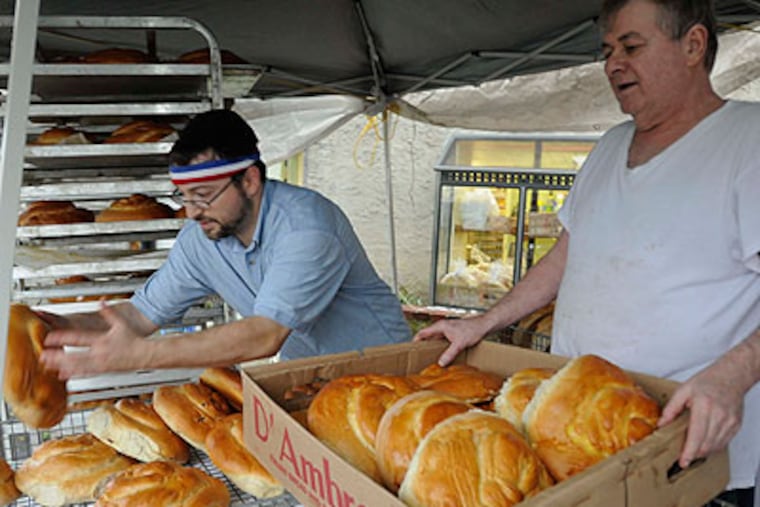Challah ritual in Elkins Park
The sky was still dark Wednesday when the faithful started to arrive at Roling's Bakery in Elkins Park. Some carried crumpled lists, moist from the morning mist, others had memorized their marching orders.

The sky was still dark Wednesday when the faithful started to arrive at Roling's Bakery in Elkins Park. Some carried crumpled lists, moist from the morning mist, others had memorized their marching orders.
"Five raisin and five plain," Deb Goldberg said in a breathy rush. "Every year I come from Center City. It's an annual ritual."
She refers to the ritual buying of the holiday challah.
This shop is so small (three's a crowd) that the Roling family sets up a tent in its minuscule parking lot off Montgomery Avenue to sell round loaves of challah for the Jewish High Holy Days.
The more significant part of the ritual takes place at sundown when Jewish families everywhere gather at their dinner tables to usher in the New Year 5772, dipping pieces of challah in honey and praying for a sweet year.
The Jewish New Year, Rosh Hashanah, begins at sunset tonight and marked the start of ten days during which individuals reflect on their behavior and seek forgiveness from those they may have wronged, whether through misdeed or inaction. The period culminates with Yom Kippur, Oct. 8, the day of atonement, when forgiveness is in God's hands.
Thus the traditional blessing: L'shana Tova, loosely translated as, may you be inscribed in the book of life for another year. In Judaism there are no long-term leases or lifetime guarantees.
The holiday challah may or may not be studded with raisins, and these days it may or may not be whole wheat.
But it most certainly must be round, to symbolize the cyclical nature of life and distinguish it from the oval challah used on the Sabbath.
Slices of apple are dipped in honey on Rosh Hashanah too, but it seems one may shop anywhere for apples and honey. For these loyalists, there is no other place for challah.
"Nobody makes challahs like Roling's," says Susan Goldberg (1 raisin, 1 regular) "Would you believe I'm schlepping these to New Jersey?
Joan Shore, 19 raisin and two plain, describes the taste as, "like cake.
This kosher bakery was founded 40 years ago by Sam Roling (formerly known as Sam the Falafel Man) and his wife, Rita, who gets all the credit when Sam is in a good mood.
The couple's grown son, Israel, runs it now and their Tehila decorates the cakes.
"This time of year, everybody works," Israel Roling says. "Even my brother the dermatologist helps out on the night shift."
The shop is so busy, there's no time to make the hand-shaped bagels for which Roling's gets year-round accolades. It's all challah, all the time. But Sam Roling is mum on the question of how many.
With no website, facebook page, twitter followers or even paid advertising, Roling's depends on word of mouth and gets it.
"It's a landmark in the neighborhood," says Edward Kleiman, buying 8 raisin and 8 plain. "And it's a side show," Kleiman adds, just as Israel Roling, who was his boyhood friend, comes by with a sack of bread and a smart remark.
Starting at 5:30 a.m. customers come in suits or in sweats. By 7:15 a.m. all the chocolate babka is gone, but the steady stream of challah sales continues until about 5 p.m., when another rush of customers come in off the SEPTA Regional Rail line across the street.
Bettina Miller, who arrived just before 6 a.m. Wednesday, may have them all beat.
Four years ago, Miller started making this annual drive in from Princeton, after her tennis partner told her about Roling's.
"When I tell people they say, 'Are you crazy?"
"But it's worth it," said Miller, who is a Catholic, married to a Jew, and has a Quaker daughter. She buys three challah, one for dinner; one for the people who arrive early and salivate at the scent; and a third for her daughter, who is studying at Oxford.
"The first year I had a hard time finding the place, because the door is in the rear. I got there after 7 a.m. and the line was down the block. Now I know."